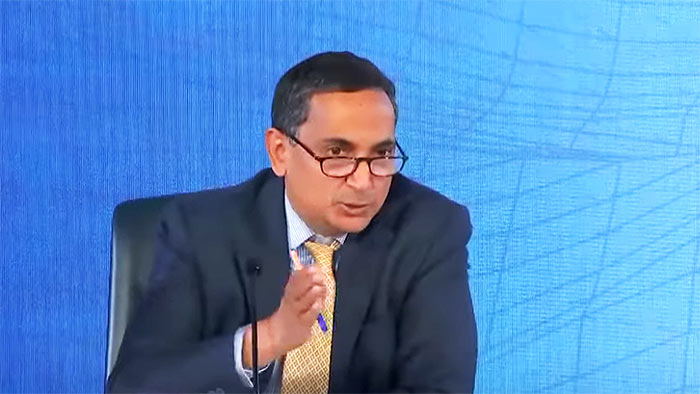Sri Lanka can be on path to prosperity if debt sustainability achieved – IMF

Krishna Srinivasan, Director of Asia & Pacific Department of the IMF. (Photo: YouTube)
Sri Lanka can be put on the path to prosperity if the debt can be made sustainable by implementing the IMF-supported program properly, the Director of Asia & Pacific Department of the IMF Krishna Srinivasan says.
Addressing a press briefing on the Regional Economic Outlook on Asia and Pacific, Srinivasan said: “Sri Lanka is a country with a quintessential problem where you had twin deficit, you had a large increase in the fiscal deficits, putting pressure on the external accounts, reserves falling, exchange rate falling.”
Sri Lanka approached the IMF for a relief program, green-lighted by the global lender’s Executive Board not too long ago, which places emphasis on macroeconomic stabilization, bringing inflation down.
On March 20, 2023, the Executive Board of the IMF green-lighted a 48-month extended arrangement under the EFF program of SDR 2.286 billion (approximately USD 3 billion) for Sri Lanka.
The EFF program opens doors for Sri Lanka to access financing up to USD 7 billion from the IMF, international financial institutions and multilateral organizations.
Srinivasan said Sri Lanka’s fiscal consolidation is based on revenue-based consolidation, partly because the island nation has among the lowest – in terms of revenue mobilization – tax collection, which goes back to the policy mistake it made pre-pandemic.
Hence, the IMF-supported program is a revenue-based consolidation which provides stability to the country’s economy, Srinivasan explained, adding that it also wants to rein in inflation, which went through the roof.
Further, the EFF program addresses governance and corruption issues in Sri Lanka, which is the first country in Asia that has had a deep diagnostic on the issue of governance and corruption, the IMF official continued.
“It’s also a program where we have a floor on how the country should support the poor and the vulnerable. And to make sure that the fiscal support they provide is temporary and targeted to the people who need it most. So, it’s a very comprehensive program and the fiscal consolidation by itself will not be enough.”
Sri Lanka needs to make good faith efforts to reach a debt agreement with its private, official and other creditors, Srinivasan noted.
Speaking on Sri Lanka’s inflation, Srinivasan said the inflation has come down, albeit from high levels. “Inflation has to come down durably because let’s not forget, inflation is the worst kind of tax on the poor, and the poor and the vulnerable are hurting the most.”
In terms of restructuring, he said when Sri Lanka’s domestic debt is restructured, it is important to make sure that financial stability is safeguarded. “The debt in Sri Lanka was assessed to be unsustainable. And that’s why, before the program could be approved, there had to be a path towards restoring sustainability. And that includes restructuring debt to all creditors — private creditors, official creditors, and to some extent, domestic debt, for the simple reason that debt sustainability is quite a big challenge in Sri Lanka.”
Latest Headlines in Sri Lanka
- Johnston Fernando, two sons and others further remanded until February 13, 2026 January 30, 2026
- Sri Lanka raises daily wage of plantation workers to Rs. 1,750 January 30, 2026
- Sri Lanka expands Internal Affairs Units to 250 more state institutions January 30, 2026
- Three arrested over Rs. 17 Million Lanka Sathosa garlic scam January 30, 2026
- Businessman arrested over Rs. 30 Million money laundering case linked to former minister January 30, 2026


